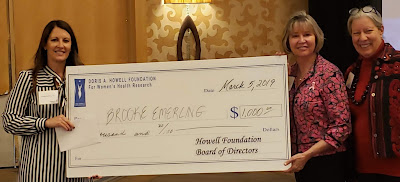And the winner is...
While efforts have reduced mortality rates by more than a third, the work in finding the cure has doubled. There are currently more than 150,000 women living with stage IV metastasized breast cancer in the US.
The Susan G. Komen Foundation held it second Metastatic Breast Cancer Conference in March, where patients, providers and researchers came together to paint a picture of the current status and advancements in treatments for MBC. Moderated by Farideh Z. Bischoff, Ph.D and CEO of FreMon Scientific, the program included presentations from a panel of experts in the field:
- Keith Wilner MD, Executive Director of Oncology at Pfizer,
- Svasti Haricharan, Ph.D, Assistant Professor at Sanford Burnham Prebys Medical Discovery Institute, and Susan G. Komen Researcher, and
- Rebecca Shatsky, MD, Breast Cancer Medical Oncologist and Assistant Clinical Professor of Medicine at Moores Cancer Center at UCSD.
The program concludes with keynote speaker Tarane Sondoozi, Psy.D, CEAP, who discussed her journey to breast cancer recovery. She is Employee Assistant Provider at Scripps Health.
A first in the Conference was the ‘fast-pitch contest’, an opportunity for researchers to present current research projects in metastatic breast cancer for the opportunity to win $1000 to help fund their research efforts. Dr. Carole Banka, Ph.D., who has published research on breast cancer metastasis and has collaborated with the Howell Foundation for over 12 years, represented the Howell Foundation as one of the judges for the event.
As part of the Howell Foundation’s guiding principle, the organization supports research efforts that benefit women in the community. “We’ve been entrusted to provide our vision and experience in advancing women’s health through research, an item that clearly aligns with the Howell Foundation’s mission to advance women’s health. It was certainly an honor to be asked to participate in an event such as the one held by the Susan G. Komen Foundation”, comments Kathleen Franklin, immediate past Co-Chair of the Howell Foundation and breast cancer survivor.
“I am encouraged by the accomplished researchers that presented at the fast pitch competition. The originality of their research programs suggests that one day –sooner rather than later— researchers will find the cure(s) for this terrible disease. It was a challenging task to determine the winner, as all the pitches were fantastic!” comments Dr. Banka. After much discussion among the judges, the panel chose to award the $1,000, donated by the Howell Foundation, to Brooke M. Emerling, Ph.D. “As a representative of the Howell Foundation, I congratulate you, Brooke, for your wonderful work.”
About Brooke M. Emerling, Ph.D
 |
| Brooke Emerling, Ph.D |
You can read more about her exciting journey researching breast cancer here.
Current Research Background
Metastatic breast cancer (MBC), also referred to as stage IV or advanced breast cancer, is largely an incurable disease. The standard of care for MBC patients is restricted to a complex management of symptoms and is often hindered by the development of therapy resistance. In the US, 154,000 women currently live with MBC.
Novel treatment strategies targeting specific cancer pathways of invasion and metastasis are paramount to improving the outcomes for women with MBC. Breast cancer metastasis is a complex multistep process, in which each step represents a significant barrier to metastatic progression, the most formidable being the foreign microenvironment to which disseminated cancer cells must adapt.
How tumor cells overcome these barriers during metastasis is critical for successful dissemination and yet remains a poorly understood process. One of the fundamental hallmarks of cancer is the reprogramming of cellular metabolism to promote tumor cell growth, proliferation, and survival. Moreover, breast cancer cells display unique metabolic signatures depending on metastatic site. Understanding the metabolic co-dependencies of metastatic breast cancer cells with their local microenvironments may reveal potential vulnerabilities suitable for therapeutic targeting.
The Emerling Lab focus
On her work, Dr. Emerling comments: “Our research focuses on a novel family of enzymes/proteins that are essential metabolic regulators and are required for the growth and metastasis of MBC cells, in particular cells with mutant p53.
The tumor suppressor p53 – ‘guardian of the genome’ and most frequently mutated gene in all cancer particular in aggressive tumors like triple negative breast cancer (TNBC). Unfortunately, it has also been difficult to directly target p53 with drugs. Therefore, targeting our proteins is extremely attractive for MBC patients, in particular patients with a p53 mutation.
Our laboratory uses a variety of complex model systems, including genetically engineered mouse models (GEMMs) which gives us the unique ability to study breast tumor initiation, maintenance and metastasis in a living organism with an intact immune system.
Our proteins are exciting ‘druggable’ targets and our research will guide future drug discovery endeavors targeting the tumor microenvironment and metastasis in MBC.
My goal and dream is to have drugs in the near future targeting these proteins in the clinic for MBC patients which will ultimately bring change and reduce MBC mortality.”
###
The Doris A. Howell Foundation for Women’s Health Research has been dedicated to keeping the women we love healthy by making a long-term, positive impact on women’s health. It is the premier organization advancing women’s health.
The organization does so by:
- Awarding undergraduate research scholarships and graduate nursing research grants to scientists researching issues affecting women’s health;
- Presenting the latest medical research findings at our events and t hrough our Speaker Service progam, where experts and researchers convey timely timely information on topics relevant to women’s health and the health of their families,
- Funding research initiatives geared towards improving the health of under-served women and increase awareness and advocacy in the community; bringing women's health research to a full cycle. ###
Summary prepared by Carolyn Northrup and revised by Carole Banka, Ph.D, with information provided by the keynote speakers and fast pitch contest winner, Brooke Emerling, Ph.D




Comments
Post a Comment